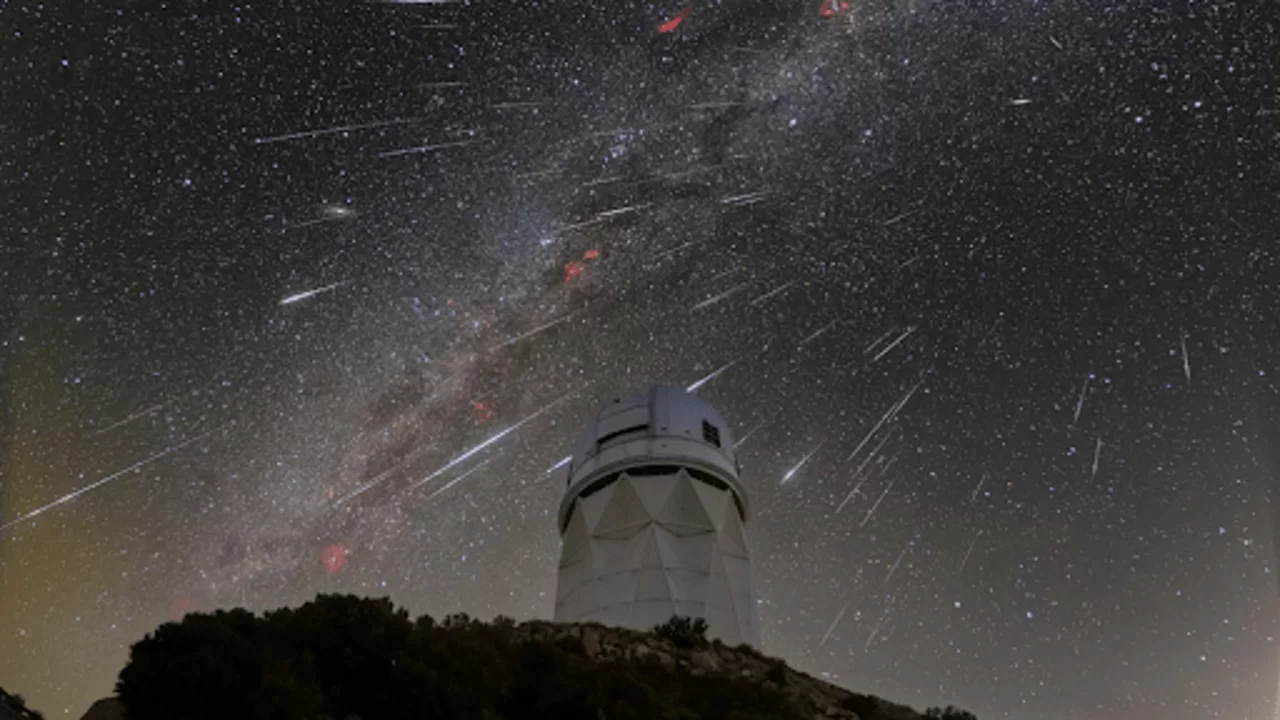
A stunning image released by NOIRLab on December 14, 2023, captures meteors from the Geminid meteor shower streaking across the night sky above the Nicholas U. This breathtaking display highlights one of the year’s most popular meteor showers, showcasing bright trails of light as the meteors burn up in Earth’s atmosphere. AP Photo
Scientists have recently found surprising clues that could change our understanding of dark energy, a mysterious force believed to be driving the accelerated expansion of the universe. For decades, astronomers have wondered what exactly causes the universe to stretch apart at such a rapid pace. The leading theory is that a force, which scientists call dark energy, is responsible. This force is thought to make up about 70% of the universe, while the matter we can see, like stars, planets, and humans, accounts for just 5%.
However, new findings from an international team of over 900 scientists suggest that dark energy might not be as constant as once believed. Earlier this year, the team published results showing that the force guiding galaxies' movement doesn’t appear to be steady. Their latest study, published on Tuesday, backs up this unexpected finding. Mustapha Ishak-Boushaki, a cosmologist at the University of Texas at Dallas, expressed his surprise, saying, "I did not think that such a result would happen in my lifetime."
The team’s research is part of an ambitious project called the Dark Energy Spectroscopic Instrument, which uses a telescope in Tucson, Arizona, to map the universe’s 11-billion-year history. By studying how galaxies have formed and moved over time, scientists aim to better understand the universe’s evolution and its future.
If dark energy were indeed constant, as previously theorized, it would fit perfectly with the mathematical model that describes the universe’s behavior. But the new data suggests that dark energy is not unchanging. Instead, it may be weakening or evolving over time, challenging astronomers' standard cosmological model. This shift in thinking could mean that dark energy is very different from what scientists have assumed – or that another, as yet unknown, force is at work.
"It's a time of great excitement, and also some head-scratching and confusion," said Bhuvnesh Jain, a cosmologist at the University of Pennsylvania, who wasn’t involved in the research. This sense of uncertainty is shared by many in the scientific community, as these new findings could upend decades of research into dark energy.
The study's latest results suggest a possible return to an older theory that, over billions of years, the universe expanded and galaxies clustered according to Einstein's general relativity. This theory might explain the changing behavior of dark energy over time. However, the findings are still preliminary, and astronomers need more data to definitively challenge the existing theory.
Robert Caldwell, a physicist at Dartmouth College, emphasized that while the new results are intriguing, they aren't conclusive. He said, "The significance of this result right now is tantalizing, but it's not like a gold-plated measurement."
The implications of these findings are immense. Dark energy is the largest force in the universe, and its behavior plays a crucial role in determining the fate of the cosmos. If dark energy remains constant, the universe will continue expanding indefinitely, growing colder and emptier. But if dark energy is becoming stronger, the universe could expand so rapidly that it could ultimately tear itself apart in a scenario called the "Big Rip."
David Spergel, an astrophysicist, reassured that, "If this is what's going on, it won't happen for billions of years." Nevertheless, understanding dark energy is crucial for unraveling the universe's future. Scientists are hopeful that further observations and analyses will help clarify whether the current theory of dark energy will stand or if a new chapter in cosmology is about to unfold.















